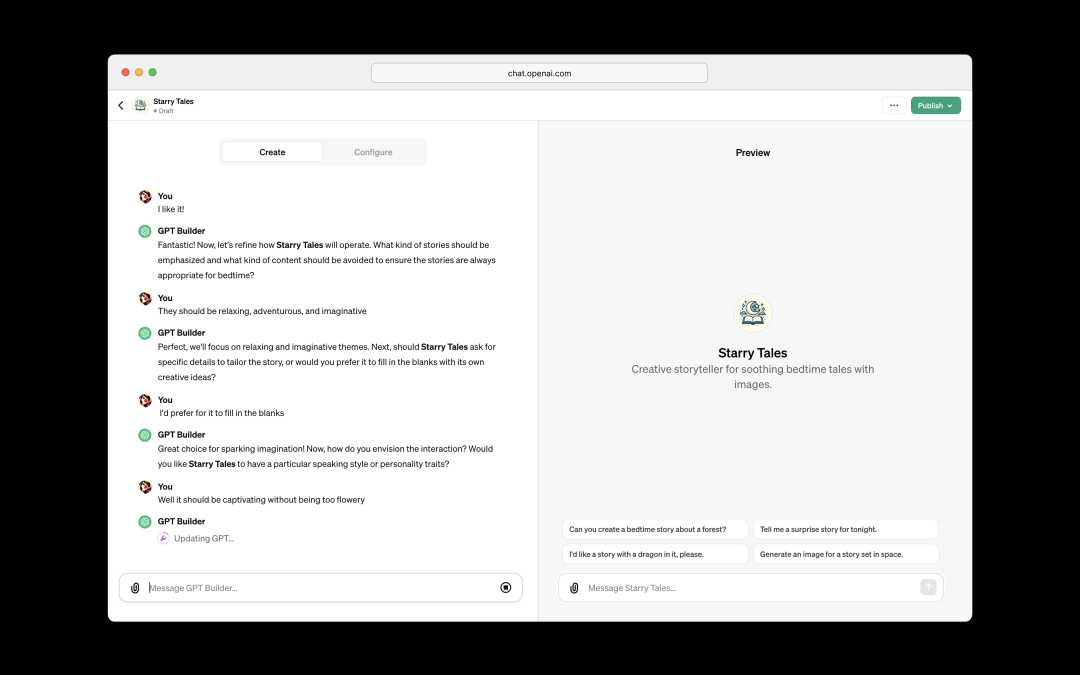OpenAI said Monday that anyone can now create a customized version of ChatGPT without any coding skills. CEO Sam Altman announced the new changes at the company’s inaugural developer conference in San Francisco, where he also unveiled a slew of other new AI tools.
OpenAI calls these custom chatbots or AI agents “GPTs.” The American AI startup says the chatbots are able to comply with specific instructions from builders and have access to information provided by users.
“The upsides of this are going to be tremendous. It gives agency to everyone.” Altman said at the event, Time reported.
“You can build a GPT for almost anything. Because they combine instructions, expanded knowledge, and actions, they can be more helpful to you,” he added.
Also read: How Elon Musk Intends to Rival ChatGPT with ‘Grok’
How to make a GPT
In a blog post, OpenAI explains that people may be keen to build tailored chatbots for various reasons, including to help with specific problems or interests in their lives, such as helping others learn the rules of a board game, teach their kids math, or help design stickers.
To create a GPT, users need to start a conversation with ChatGPT, specifying what they would want the chatbot to do, like searching the web, making images, or analyzing data. ChatGPT will automatically create the code needed to set up and run the new bot.
“GPTs are a new way for anyone to create a tailored version of ChatGPT to be more helpful in their daily life—at specific tasks, at work, or at home—and then share that creation with others,” OpenAI said in its blog post.
“Anyone can easily build their own GPT—no coding is required.”
“We believe the most incredible GPTs will come from builders in the community. Whether you’re an educator, coach, or just someone who loves to build helpful tools, you don’t need to know coding to make one and share your expertise,” the company added.
GPTs are a new way for anyone to create a tailored version of ChatGPT to be more helpful in their daily life, at specific tasks, at work, or at home — and then share that creation with others. No code required. https://t.co/SPV4TcMiQw pic.twitter.com/PcmorZwtMF
— OpenAI (@OpenAI) November 6, 2023
OpenAI said it will launch a GPT store later this month, where popular tools made by “verified builders” chosen by the company can be accessed more widely.
“Once in the store, GPTs become searchable and may climb the leaderboards,” the blog post said. “We will also spotlight the most useful and delightful GPTs we come across in categories like productivity, education, and ‘just for fun’.”
The company said that “in the coming months,” chatbot builders would be able to earn money based on the number of people using their GPT.
OpenAI to pay copyright claims
Users of ChatGPT Plus and Enterprise, both subscription-based, will be able to start building their own GPTs starting Nov. 6.
OpenAI said some companies, including biotech company Amgen and payments processor Square, are already creating their own versions of ChatGPT and using them internally for things like craft marketing or to answer customer queries.
At the San Francisco developer conference, Sam Altman revealed that more than two million developers and 92% of Fortune 500 companies are using its APIs, which provide access to ChatGPT or the underlying text- and image-generating tech in some way, Wired reported.
The OpenAI CEO also said that ChatGPT now boasts 100 million active users each week. “About a year ago, we shipped ChatGPT as a low-key research preview, and that went pretty well,” Altman said. “OpenAI is the most advanced and widely-used AI platform in the world now.”

In its blog post, the company stated that it will cover the legal costs of its business customers if they are sued for copyright infringement for using its generative AI models. Companies like Google and Microsoft are already doing this.
“Today, we’re going one step further and introducing Copyright Shield; we will now step in and defend our customers and pay the costs incurred if you face legal claims around copyright infringement,” the company said.
Artists and creators have criticized generative AI tools like ChatGPT and Google Bard for illegally scraping data from their works without permission. Many creators have gone to court to challenge the data used in the training of the AI chatbots.
More powerful GPT-4 version
According to OpenAI, user conversations with their customized bots will not be shared with builders, even though a creator of a GPT will have the option to choose whether users’ chats can be used to train OpenAI’s models.
People will not be able to build GPTs that violate OpenAI’s content policies, which don’t allow violent and sexually explicit types of content, among others.
“GPTs will continue to get more useful and smarter, and you’ll eventually be able to let them take on real tasks in the real world,” OpenAI said in its blog post.
“In the field of AI, these systems are often discussed as “agents”. We think it’s important to move incrementally towards this future, as it will require careful technical and safety work—and time for society to adapt.”
Other announcements that OpenAI made on Monday include a new user interface for its viral chatbot ChatGPT, a new and more powerful GPT-4 model, as well as a new text-to-speech artificial intelligence model.









 and then
and then